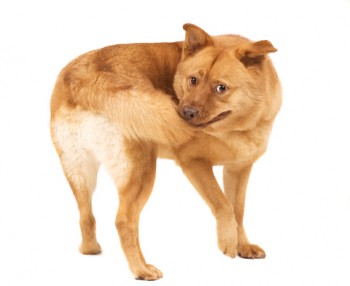 Most of us are pretty quick to realize when our dogs need medical care when the cause is physical such as a cut or a difficult birth. But have you ever stopped to consider your dog’s mental health? At my house, the biggest mental health issue we have is my Golden’s fear of thunderstorms. I always know when a storm is brewing because she lands dead center on my back while I am sleeping. (All 75 pounds of her, flying through the air and landing with a WHUMP! on top of me, making me very glad we got her.)
Most of us are pretty quick to realize when our dogs need medical care when the cause is physical such as a cut or a difficult birth. But have you ever stopped to consider your dog’s mental health? At my house, the biggest mental health issue we have is my Golden’s fear of thunderstorms. I always know when a storm is brewing because she lands dead center on my back while I am sleeping. (All 75 pounds of her, flying through the air and landing with a WHUMP! on top of me, making me very glad we got her.)
Some dogs suffer from neuroses such as obsessive-compulsive disorder. Have you ever had a dog lick or chew on a certain spot of his body? Your couch? Any behavior that serves no real purpose that is repeated over and over may be a sign that the dog is becoming compulsive.
Sometimes there is a trigger, at which time the behavior makes sense, but the dog seems to get stuck on it, performing the behavior over and over after the trigger no longer exists. For example, the dog may chew on a toe because he has an itch or a thorn stuck in the paw. Once the itch stops itching or the thorn is removed, the behavior should stop, but for some reason, the dog continues to worry over the toe. If it continues long enough, he can actually create a bigger problem because the area around the toe never dries out, creating an environment just looking for a fungal or yeast infection.
Other theories for compulsive behavior include genetics, anxiety, and self-rewards. The genetic model assumes that if the dog’s parents or grandparents were neurotic, he will be too. Under the anxiety hypothesis, the dog becomes compulsive because he is nervous and the behavior calms him down in some way. The self-reward theory states that when the dog performs the obsessive behavior, his brain releases endorphins, the “feel good” brain chemical.
So, what can you do if your dog’s obsessive-compulsive behavior patterns are driving you nuts? Patience and finding the underlying cause are key to curing your dog. Punishment simply doesn’t work because the behavior is not something the dog actually wants to do; rather he feels compelled to do it. The first step to solving the problem is to have him checked by your veterinarian to see if there is a physical reason for his behavior. Your vet may suggest that you need to feed a different diet or may need special training. Finally, you may have to medicate your dog to help him rid himself of the behavior. Once you get the behavior under control with medication, which can take as long as 4 – 6 months, you can begin working on the underlying problem that caused the obsession in the first place.
Take a look at his environment. Are you providing enough mental and physical stimulation to keep him from getting bored? Make sure you are walking him daily and giving him toys that require him to think, such as Kong toys, where he has to find a way to get the treat out of the toy. You may need to work on desensitizing him to the trigger, or redirecting him when he starts to obsess about something.
For more information, check out this post on msnbc.com.
Until next time,
Good day, and good dog!
